ODESZA Scales Up to L-Acoustics K1 Concert Sound System ODESZA Scales Up to L-Acoustics K1 Concert Sound System...
For their The Last Goodbye Finale Tour, the Grammy Award-nominated electronic-music duo brought as many as 19 musicians onstage at once, supported by the clarity and control of a vast K Series concert sound system
SEATTLE, Washington – July 2024 – “I don’t think anyone has ever seen a show like this one.” That’s Eric Rogers, concert sound system engineer at Clearwing Productions, speaking about The Last Goodbye Finale Tour, ODESZA’s emotional farewell to their iconic The Last Goodbye Tour, which has captivated audiences since its inception in 2022. In June and July, the tour made its last stops at legendary venues like NYC’s Madison Square Garden, BMO Stadium in L.A., and Folsom Field in Boulder, culminating with a run of shows at The Gorge Amphitheatre in their home state of Washington. These shows were a celebration of the group’s most innovative musical era to date, which included the 2022 release of their critically acclaimed The Last Goodbye album, Grammy-nominated for Best Electronic Album. It’s a live production sure to become something of historic significance both for ODESZA fans and for electronic music touring as a whole.
These shows were the first stadium appearances for Harrison Mills and Clayton Knight, the duo that makes up ODESZA, who perform with banks of synths and other MIDI-controlled components. “This run of shows was also different because we had as many as 19 musicians onstage at once at times, playing trumpet, trombone, guitar, a six-piece string section, and an eight-piece drum line,” says Rogers, who has been with ODESZA since 2017’s A Moment Apart Tour. “We had a small army up there. I was fortunate to have talked with the production manager, Shane Crowl, from Motion Music early on, and he wanted to make sure that every seat on this tour, front to back, had a great experience with consistent sound quality and vocal intelligibility from the first note to last. I was very happy to hear that he basically said, ‘Design a system that delivers that; you can have anything that you need.’”
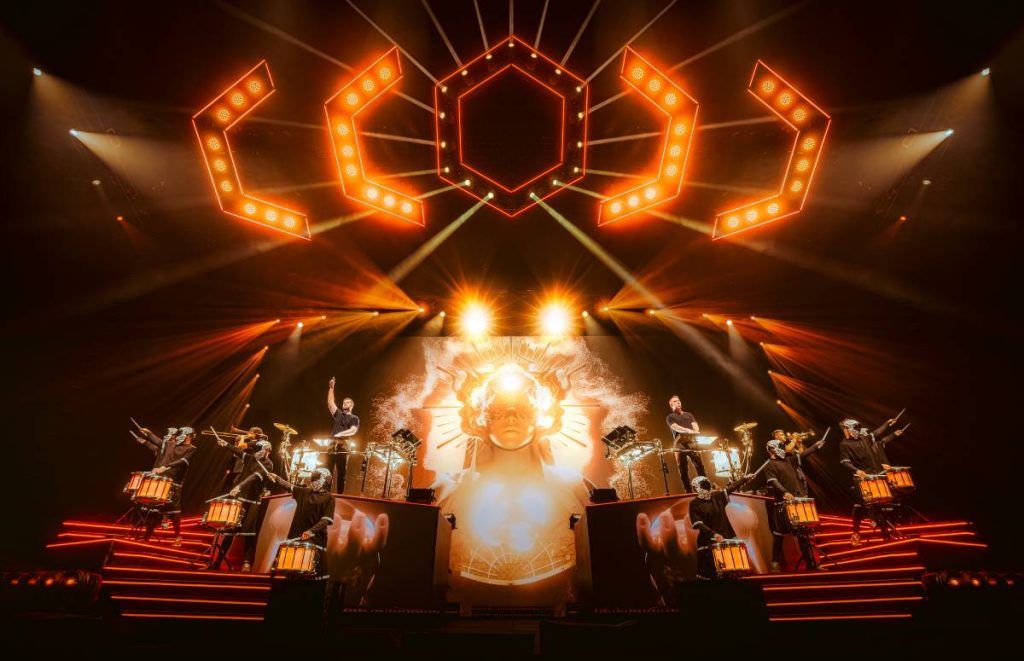
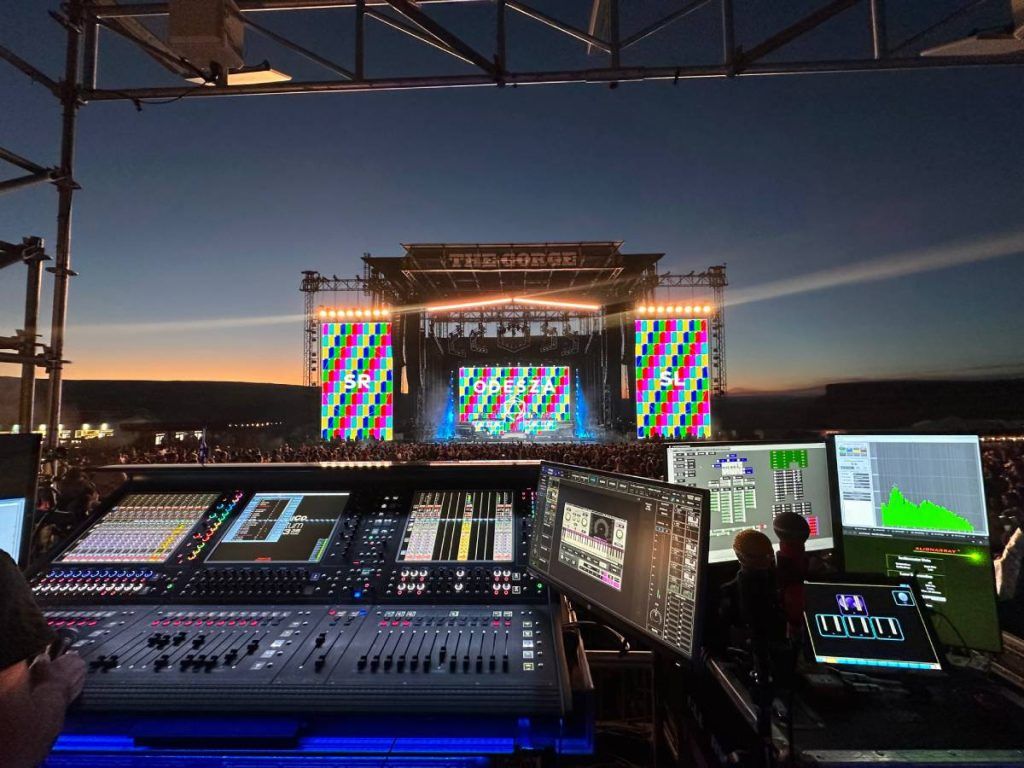
The resulting choice was a vast L-Acoustics K Series concert sound system of 256 enclosures in total, comprising left and right arrays of 16 K1 over four K2, each flown in front of a 16 K1-SB low-frequency extension hang, and flanked by adjacent hangs of 16 K1-over-four-K2 as out-fill (sometimes instead configured as eight K1 over six K2, topped by four K1-SB, depending upon the venue). Onstage, monitors comprised a KS28 under each riser, as well as six Kara II, five SB18, and two X8, along with 26 channels of Wisycom IEMs.
Any electronic music show needs strong bass, and that was provided by lining the front of the stage with 48 cardioid-configured KS28 subs, end-stacked in blocks of three, with single A15 Focus enclosures mounted to the eight central sub-groupings for front-fill. “That provided the most efficient rejection towards the rear, with minimal loss forward,” Rogers explains. “The last two stacks in the sub array were positioned to a 45-degree end-fire to shift more LF energy into the stands.” Infrastructure for the system used AVB for connectivity, which Rogers says offered the best redundancy options. A total of 96 LA12X amplified controllers divided between four Clearwing-custom stage racks powered the massive system, which was managed using three L-Acoustics P1 Milan-AVB processors.
Underscoring the scale of the system was the fact that each and every crewmember had their own IEMs, and department leads held wireless microphones, all riding on an intercom system designed and managed through a DiGiCo SD10-RE rackmount console—one of three DiGiCo Quantum and SD-Range FOH and monitor consoles, three SD-Racks, and one MiNi-Rack used to manage the complex 124-input production.
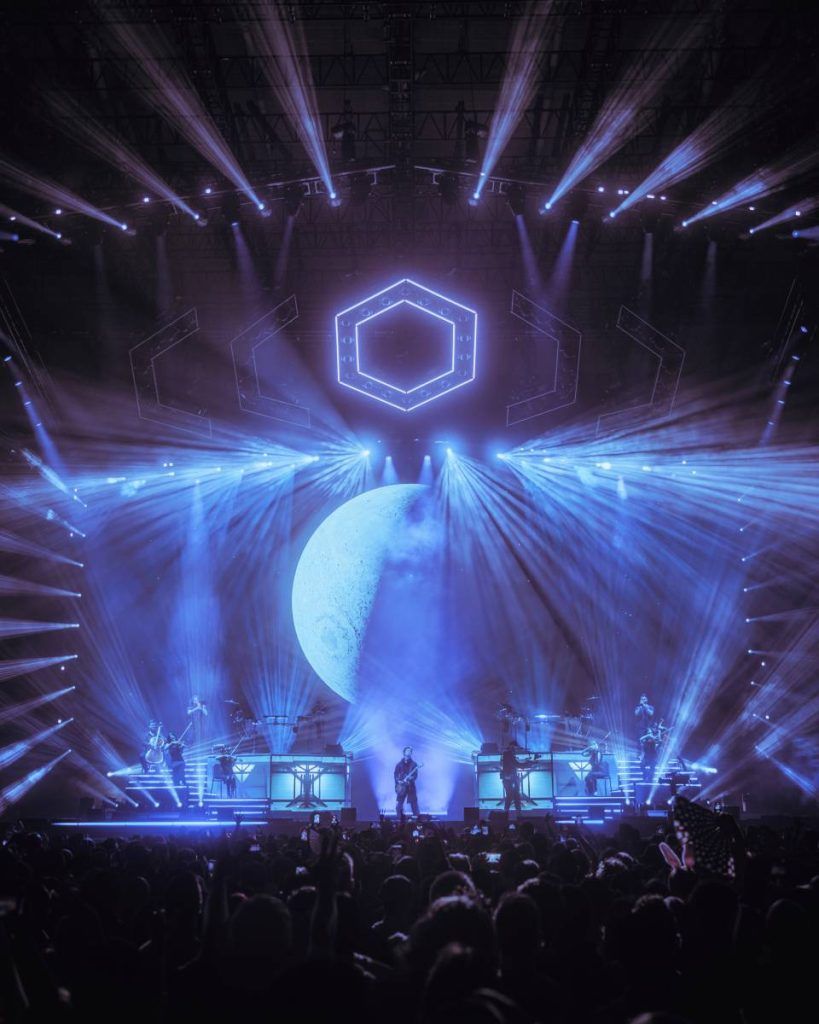
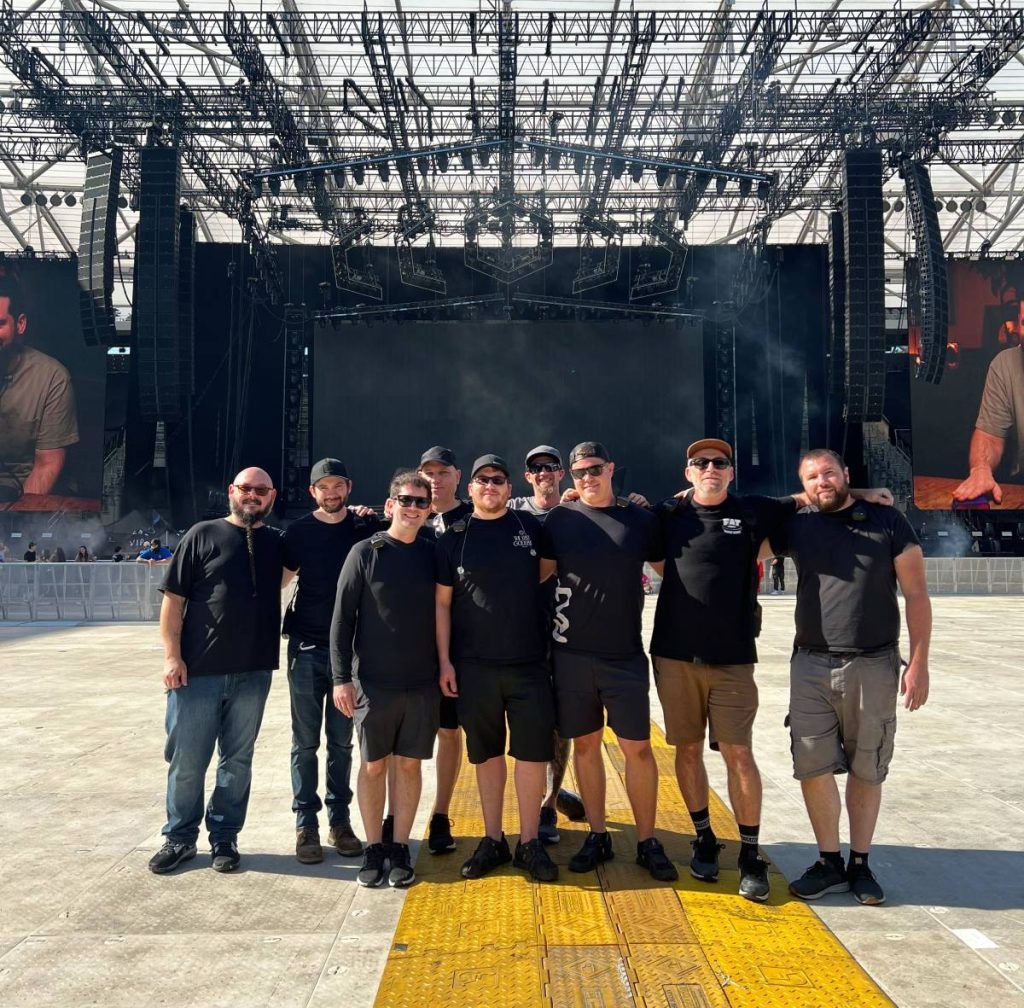
“This was the first time that I’ve designed a concert sound system without any compromises,” Rogers marvels. “K1 was the obvious choice to make that happen.” The challenge, he relates, was to create consistent and sustainable impact from front row to last within the wide dynamic range of the new band lineup. “It wasn’t a constant 102 or 103 dB in your face like a typical EDM show might be,” he says. “There were softer moments, maybe 94 dB, and those needed to be felt as impactfully 450 feet away in the upper tier as in the front rows. The power and clarity of K1 and K2 let us provide excellent sound and experience at all volume levels to every seat in the house.”
Front-of-house engineer Joe Spitzer says an electronic tour frequently challenges its sound system to deliver enough power to match the music. “You often have to push the system close to its limits, sometimes even asking it to deliver more than it can,” he says. “With K1, we had the opposite effect—plenty of power—and our challenge was to harness it as effectively as possible. We discovered just how much power there was on the first gig at BMO during soundcheck. The rest of the time we spent fine-tuning it. It was a great experience.”
Spitzer says the concert sound system responded well to the nuances and sensitivities of the combined electronic and acoustical sound sources, from brass instruments to the dozen stereo tracks that also supported the performances. “The transparency of K1 was immediately apparent, and it let the live elements of the show really shine through,” he says. “I couldn’t think of a better system for a show like this. It delivered both what the artists needed for their music and also what we needed for control. And that’s because L-Acoustics is a total solution—the best large-format boxes and the best software on the market. That’s always a winning combination.”
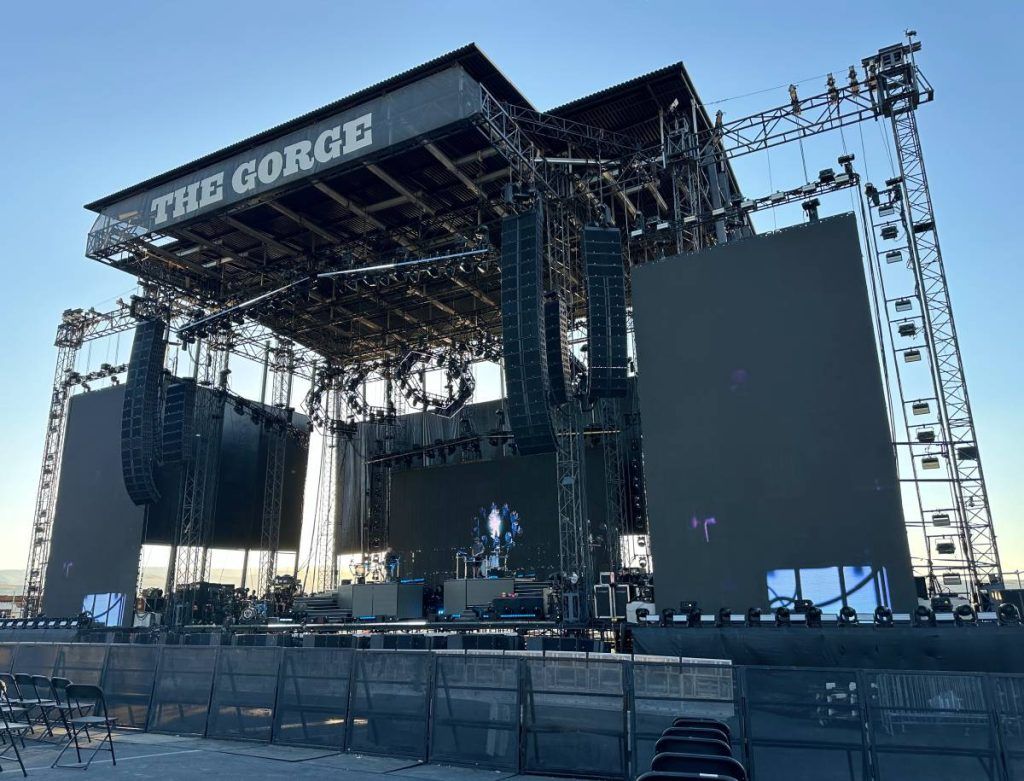
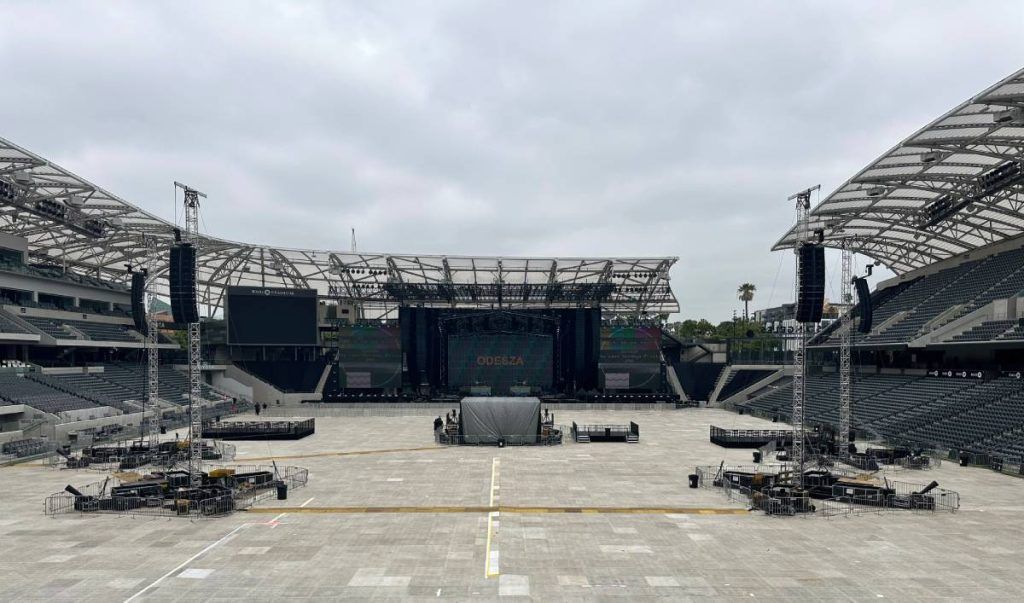
For more details on ODESZA, visit www.odesza.com. Clearwing can be found online at www.clearwing.com.
Press release assets are found by clicking here.